KFF Health Tracking Poll – October 2020: The Future of the ACA and Biden’s Advantage On Health Care
Aca And Health Care
Key Findings
- The confirmation hearings for Judge Barrett, President Trump’s appointment to fill the Supreme Court seat previously held by Justice Ginsburg, are underway this week and the future of the ACA’s protections for people with pre-existing conditions have been front-and-center. The latest KFF Health Tracking Poll finds a large majority of the public – including majorities of Democrats (91%), independents (81%), and Republicans (66%), now say they do not want to see the Supreme Court overturn the ACA’s pre-existing condition protections. The share who do not want to see these protections overturned has increased by double digits from one year ago for each group.
- Six in ten adults say they do not want to see the Supreme Court overturn the entire ACA, up 10 percentage points from one year ago. This includes majorities of both Democrats (89%) and independents (66%), but three-fourths of Republicans still want to see the entire law overturned. Overall views of the Affordable Care Act are slightly more positive this month, with 55% of the public saying they view the law favorably. This ties its highest favorability measured in ten years of KFF polling (tied with February 2020).
- Vice President Biden has the advantage over President Trump on all health policy issues included in the survey including at least a 20 percentage point advantage on who voters think has the better approach (Biden or Trump) to make decisions about women’s reproductive health choices and services, including abortion, family planning, and contraception (57% v. 34%), determining the future of the ACA (57% v. 37%), and maintaining protections for people with pre-existing health conditions (56% v. 36%). He also holds an advantage on surprise medical bills, the coronavirus outbreak and distribution of a vaccine, and lowering health care costs for individuals.
- While both presidential candidates say they have plans to ensure pre-existing condition protections, most Democrats and independent say they do not think President Trump has a plan to maintain such protections. Slightly more than half (53%) including majorities of Democrats (90%) and independents (57%) say they “do not think President Trump has a plan to maintain protections for people with pre-existing health conditions.” On the other hand, a large majority of Republicans (85%) say President Trump “has a plan” to maintain these protections afforded by the ACA.
The Affordable Care Act and the Supreme Court
This week marked the beginning of the U.S. Senate’s confirmation hearings for President Trump’s appointment to fill the seat held by the late Justice Ruth Bader Ginsburg. One of the major focuses of the Senate Judiciary Committee’s hearings for Judge Amy Coney Barrett has been her views of the constitutionality of the 2010 Affordable Care Act (ACA). The Court is set to hear oral arguments for California v. Texas, a case backed by the Trump administration challenging the future of the law, on November 10th.
Eight in ten adults (79%) say they do not want to see the Supreme Court overturn the protections for people with pre-existing conditions established by the Affordable Care Act and a majority of U.S. adults (58%) also say they do not want to see the Supreme Court overturn the entire 2010 law. Majorities of Republicans (66%), independents (81%), and nine in ten Democrats (91%) say they do not want to see the Supreme Court overturn the pre-existing condition protections in the ACA. Nine in ten Democrats (89%) and two-thirds of independent (66%) also say they do not want to see the Supreme Court overturn the entire law while three-fourths of Republicans (76%) say they would like to see the entire law overturned.
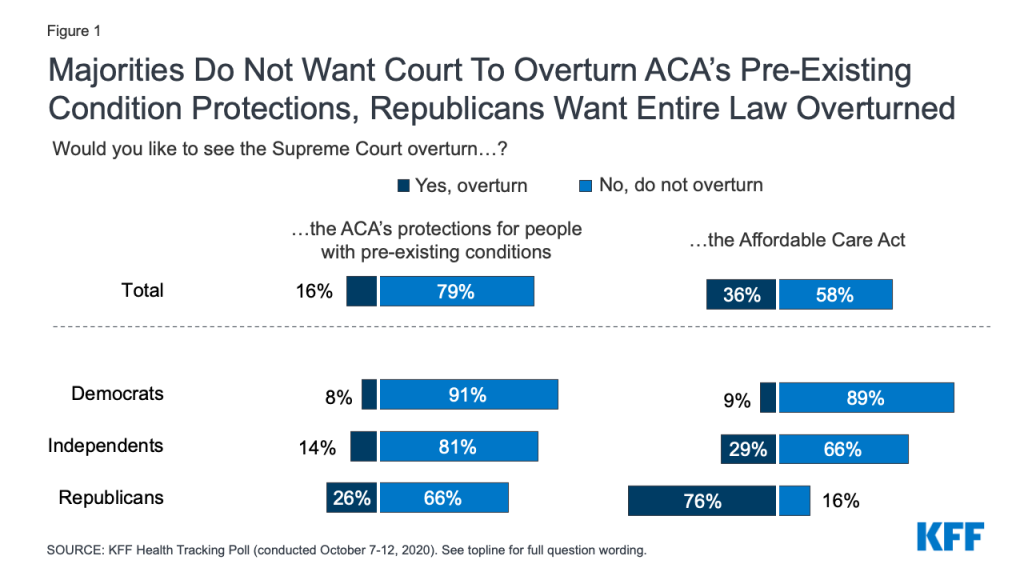
The ACA’s protections for people with pre-existing medical conditions has been a dominant issue in the 2020 presidential campaign since the passing of Supreme Court Justice Ginsburg and larger shares of the public now saying they do not want to see these protections overturned (up 17 percentage points from last November). A majority of Republicans now say they do not want to see the pre-existing condition protections overturned (up 19 points from last year), and while majorities of Democrats and independents had previously said they did not want to see these protections overturned, the share among these groups has also increased (16 percentage points and 18 points, respectively).
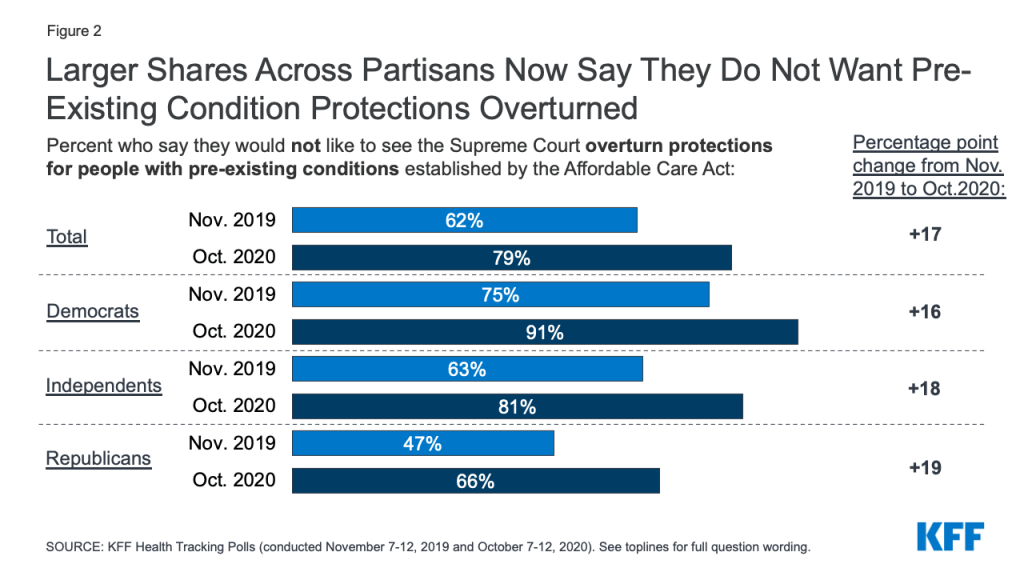
There is also a slight increase in the share who say they do not want to see the ACA overturned, up 10 percentage points from November 2019 and five percentage points from July of this year. A larger share of Democrats and independents now say they do not want to see the law overturned, compared to a year ago (up 13 percentage points and 16 points, respectively), while the share of Republicans who want to see the entire law overturned has remained relatively steady (71% in November 2019 to 76% in the latest poll).
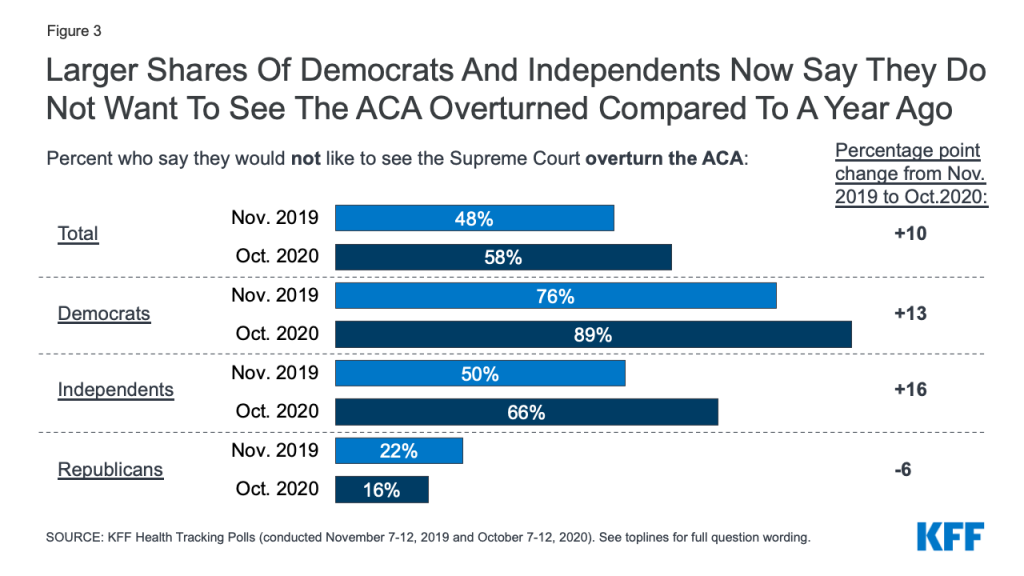
While both presidential candidates say they intend to ensure pre-existing condition protections, most Democrats and independent say they do not think President Trump has a plan to maintain such protections. Slightly more than half (53%) including majorities of Democrats (90%) and independents (57%) say they “do not think President Trump has a plan to maintain protections for people with pre-existing health conditions.” On the other hand, a large majority of Republicans (85%) say President Trump “has a plan” to maintain these protections afforded by the ACA. While President Trump signed an executive order on Sept. 24th saying people with pre-existing conditions should be able to obtain health insurance at an affordable rate, the order does not guarantee coverage if the ACA is overturned.
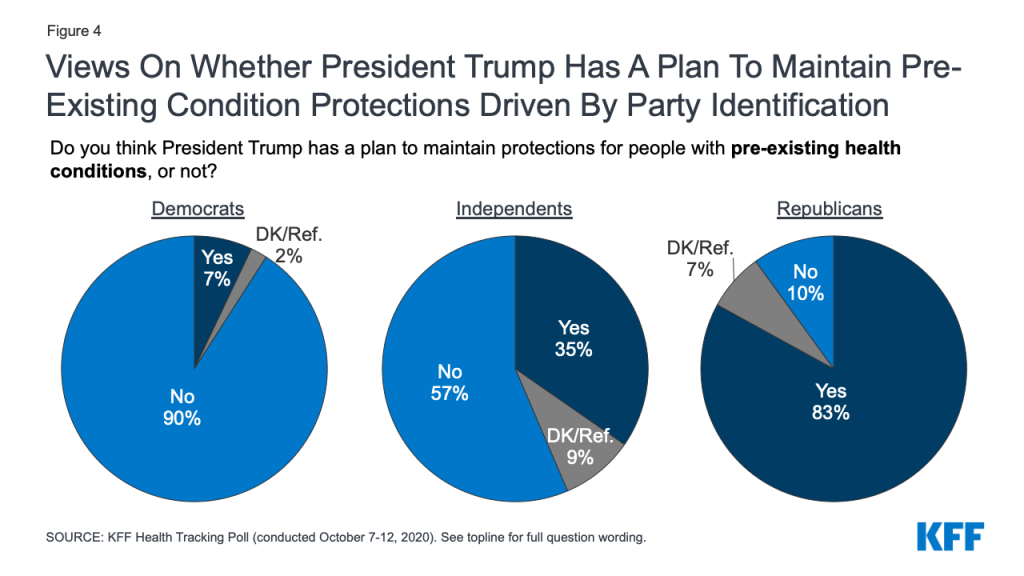
About half of adults say they are worried they or someone in their family will not be able to afford health coverage (54%) or will lose coverage (51%) if the Supreme Court overturns the entire Affordable Care Act. While at least seven in ten Democrats express worry about not being able to afford coverage (76%) or losing coverage (71%) as do at least half of independents (58% and 53%, respectively), a smaller share of Republicans express similar worries with about one-fourth saying they are worried about not being able to afford coverage (23%) or losing coverage (23%) if the entire ACA is overturned.
| Table 1: Worries About Losing Coverage, Not Being Able To Afford Coverage By Party Identification | ||||
| Percent who say they are worried about each of the following if the entire ACA is overturned: | Total | Democrats | Independents | Republicans |
| Not being able to afford coverage in the future | 54% | 76% | 58% | 23% |
| Losing health insurance coverage in the future | 51 | 71 | 53 | 23 |
About six in ten adults (59%) say they live in a household with someone with a pre-existing or chronic health condition that would have led to them being denied coverage or having to pay more prior to the passing of the ACA. Click here to see more on the pre-existing health conditions that were previously deemed as “declinable” or “uninsurable.”
Views Of The Affordable Care Act
In light of the recent attention to the Affordable Care Act, 55% of the public now hold a favorable view towards the law (up slightly from 49% last month). This matches the ACA’s highest point in favorability first measured back in February 2020, during the height of the 2020 Democratic primary and before the coronavirus outbreak largely impacted the U.S. While a majority of the public view the law favorably, four in ten (39%) continue to view law unfavorably including eight in ten Republicans (79%), as well as about one-third of independents (35%) and one in ten Democrats (9%).
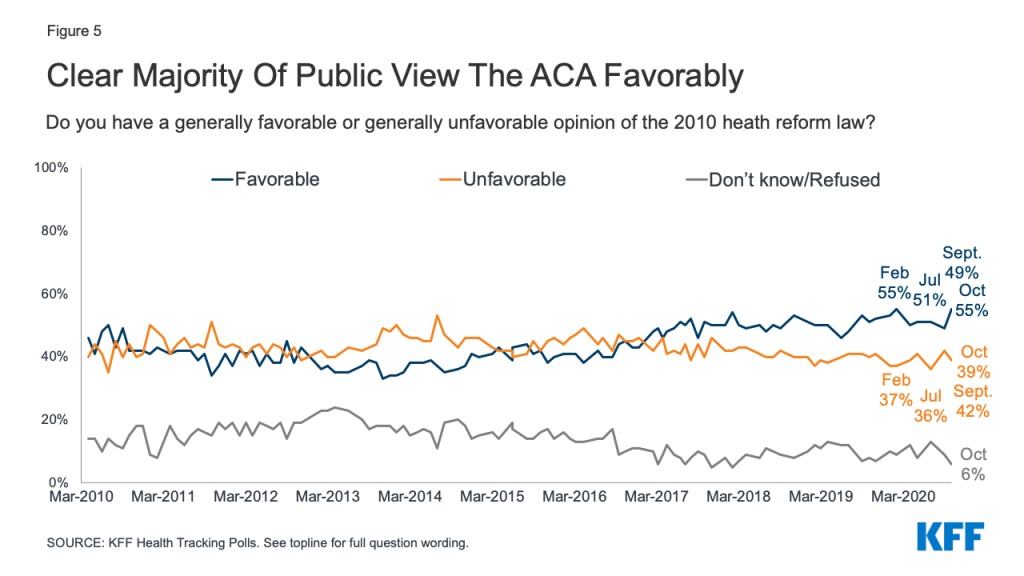
Public Attitudes’ Towards Roe v. Wade Remain Steady
About seven in ten (69%) Americans say they do not want to see the Supreme Court to overturn the 1973 Roe v. Wade ruling that established a woman’s constitutional right to have an abortion. Nine in ten Democrats (91%) do not want to see the law overturned as do three-fourths of independent (76%). More than half of Republicans (57%) say they want to see Roe v. Wade overturned. Partisans’ attitudes towards the landmark case are unchanged from a January 2020 KFF survey examining attitudes towards and knowledge of U.S. reproductive health policy.
The Role Of Health Care In The 2020 Election
The latest KFF Health Tracking Poll, conducted one month prior to the 2020 presidential election, finds that the economy continues to hold the top issue spot for voters deciding their 2020 presidential vote choice. Three in ten (29%) voters say the economy will be the “most important issue” in deciding their vote for president. This is similar to the share of voters who say the coronavirus outbreak, a major public health issue, will be the most important issue to their vote (18%) as well as health care, more generally, (12%). About one in ten voters say issues including criminal justice and policing (13%), race relations (11%), and the appointment of a Supreme Court justice (11%) are the most important in deciding their vote this fall.
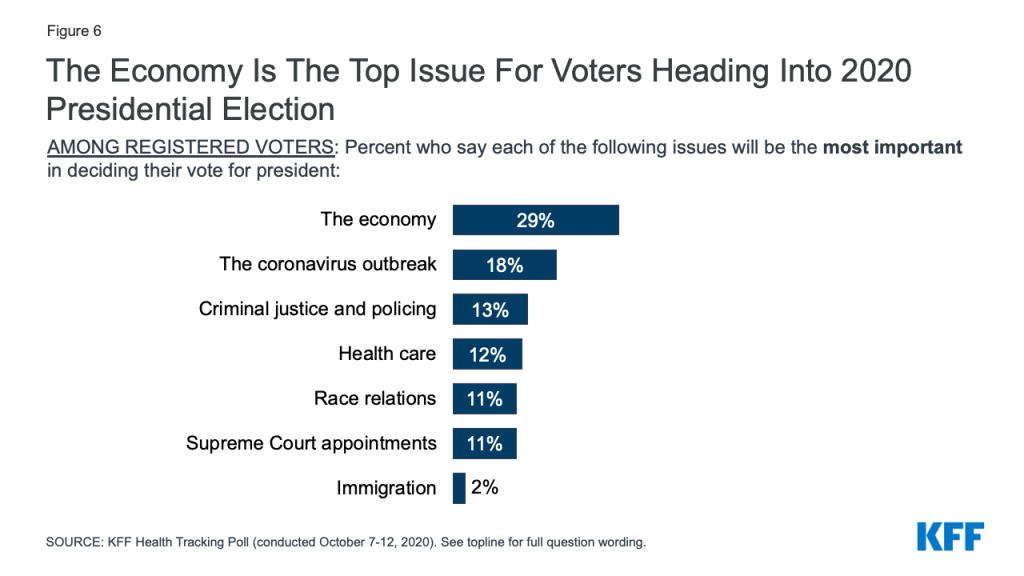
Nearly half of Republican voters (45%) choose the economy as their top issue in deciding which candidate to vote for president as do one-third of independent voters. Across the political aisle, health care is dominant for Democratic voters with one-third of Democratic voters (32%) saying the coronavirus outbreak will be the most important issue in deciding their vote and one in five Democratic voters saying the same about health care more generally.
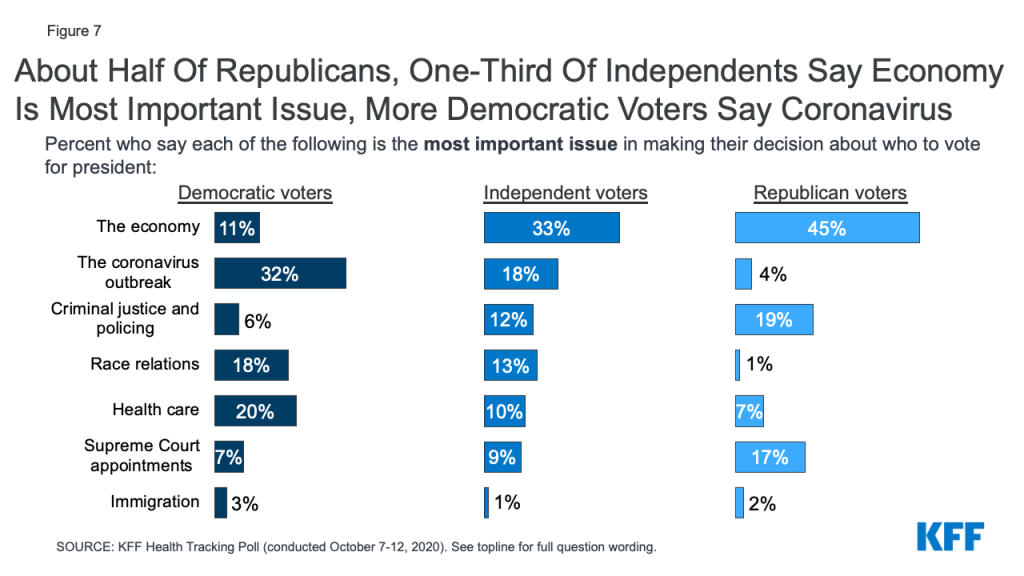
How Specific Health Care Priorities Drive Voters
When given a list of possible health care policy areas that may play a role in deciding their vote for president, most voters say each of these issues is important. Nearly all voters (94%) say protections for people with pre-existing conditions will be important to their vote, including three-fourths (74%) who say it is “very important.” About six in ten voters also say lowering the cost of health care for individuals (63%), determining the future of the Medicare program (62%), dealing with the health aspects of the coronavirus outbreak (60%), determining the future of reproductive health issues including abortion (60%), and lowering prescription drug costs (59%) are “very important” in deciding their vote for president this year. Majorities also say the same about expanding coverage for the uninsured (52%) and determining the future of the ACA (52%).

When asked to choose the most important health care issue among this list of possible issues, voters are divided across the issues. Nearly one in five voters (17%) say protections for people with pre-existing conditions is the most important health care issue in making their decision about who to vote for president, followed closely by the future of reproductive health issues including abortion (15%), and lowering the cost of health care (13%) rounding out the top three health care issues to voters.
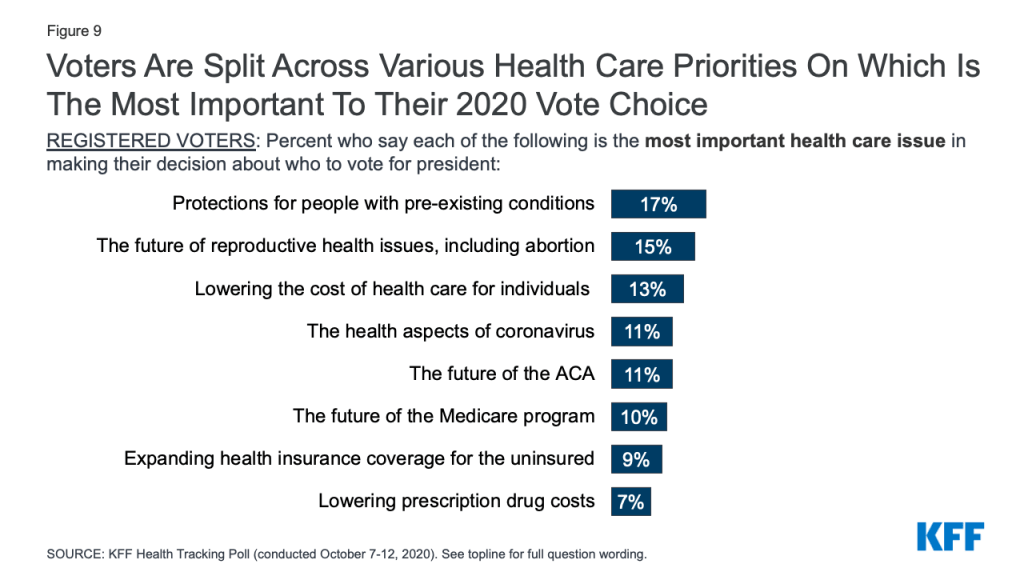
The health care issue that matters most to voters is largely driven by their party identification. One-fourth of Republican voters (24%) say determining the future of reproductive health issues including abortion is the health care issue most important to their 2020 vote, while one-fifth of independent voters (21%) say pre-existing condition protections is the most important health care issue to their vote. Democratic voters are divided across many health care priorities including most notably dealing with the health aspects of the coronavirus outbreak (17%), determining the future of the ACA (17%), and protections for people with pre-existing conditions (14%).
| Table 2: The Role of Health Care Issues For Partisan Voters In 2020 Election | |||
| Percent who say each of the following health care issues is most important to their 2020 presidential vote: | Democratic voters | Independent voters | Republican voters |
| Maintaining protections for people with pre-existing conditions | 14% | 21% | 15% |
| Lowering the cost of health care for individuals | 10 | 13 | 14 |
| Dealing with the health aspects of the coronavirus outbreak | 17 | 11 | 5 |
| Determining the future of reproductive health issues including abortion | 10 | 13 | 24 |
| Determining the future of the Affordable Care Act | 17 | 10 | 6 |
| Expanding health coverage for the uninsured | 12 | 12 | 2 |
| Determining the future of Medicare | 11 | 8 | 9 |
| Lowering prescription drug costs | 4 | 6 | 13 |
Biden Has Clear Advantage On Key Health Care Issues
Former Vice President Biden has the edge on all health care issues over President Trump with at least half of voters saying they think Biden has the better approach to handling a series of health care issues asked about in the poll. Biden has at least a 20 percentage point advantage among voters on who they think has the better approach (Biden or Trump) to making decisions about women’s reproductive health choices and services, including abortion, family planning, and contraception (57% v. 34%), determining the future of the ACA (57% v. 37%), and maintaining protections for people with pre-existing health conditions (56% v. 36%). He also holds a double-digit advantage on several other health care policy issues including protecting people from surprise medical bills (52% v. 37%), dealing with the coronavirus outbreak (55% v. 39%), and lowering the cost of health care for individuals (54% v. 40%). Biden also does better – to a slightly lesser degree – on his approach to overseeing the development and distribution of a coronavirus vaccine (51% v. 42%) and lowering prescription drug costs (50% v. 43%).
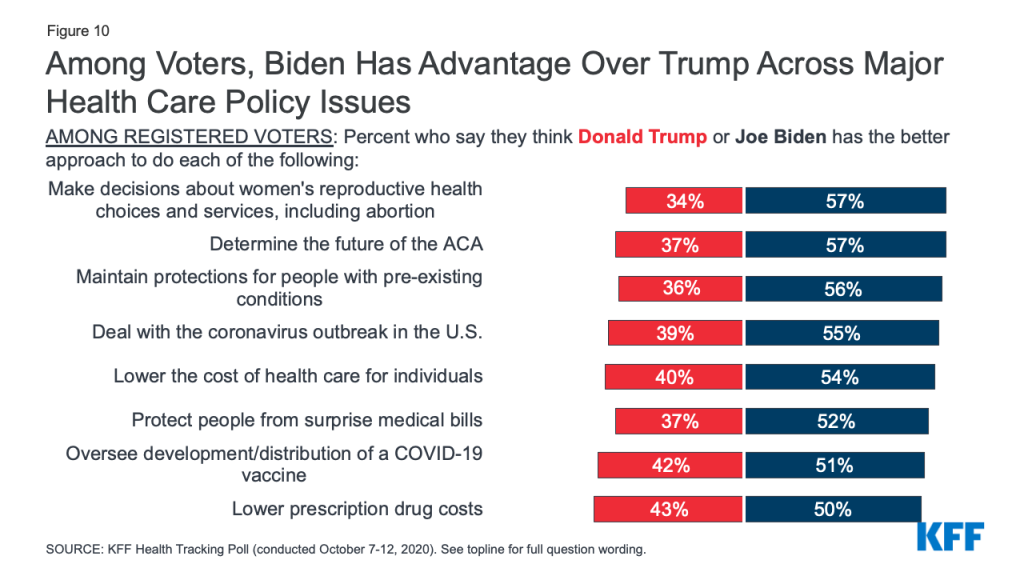
President Trump recently announced that 33 million Medicare beneficiaries will soon receive a discount card to help pay for the cost of prescription drugs. Voters’ assessment of which candidate has the better approach to lower prescription drug costs has shifted slightly since September, with Biden now having the advantage over President Trump on which candidate has the better approach to lowering prescription drug costs (42% v. 46% in September compared to 50% v. 43% in October).
MAjority Of Senior Voters Trust Biden On Health Care Issues
At least half voters 65 and older, say they think Biden has the better approach across all health care policy areas including key advantages over President Trump on determining the future of the ACA (57% v. 38%), surprise medical bills (53% v. 40%), maintaining pre-existing condition protections (55% v. 42%), and reproductive health policy (53% v. 41%). Biden has a smaller advantage on handling of both the coronavirus outbreak (54% v. 43%) and the distribution of a vaccine (53% v. 45%). Determining the future of Medicare is the top health care issue for senior voters with about one-fifth (22%) of voters 65 and older saying this is the most important health care issue to their vote. About one in eight senior voters say reproductive health issues (13%) and maintaining protections for people with pre-existing conditions (14%) are their top health care issues, followed closely by dealing with the many health aspects of the coronavirus (10%).
Coronavirus In The U.s.
These additional findings were released October 20.
Key Findings
- With more than 200,000 Americans dead from the coronavirus and with cases rising in many parts of the country, about two-thirds of adults (66%) say they are worried that they or someone in their family will get sick from coronavirus, an increase of 13 percentage points since early April. The share of Democrats who say they are worried about themselves or someone in their family getting sick from coronavirus has increased by 31 percentage points since April, while the share of Republicans expressing this worry has remained about the same.
- Following President Trump’s coronavirus diagnosis, about three in ten adults say the President’s recent diagnosis makes them more likely to practice social distancing or to wear face masks. Most Republican voters say the President’s diagnosis does not impact their likelihood to vote for him.
- Majorities of the public think President Trump is intervening with the FDA’s and CDC’s coronavirus related work. While most say they have at least a fair amount of trust in the FDA to ensure that an approved coronavirus vaccine is safe and effective (71%) and trust in the CDC to issue coronavirus related guidelines based on scientific evidence (72%), only about three in ten say they have a great deal of trust in these agencies.
Coronavirus Outbreak in the U.S.
The latest KFF Health Tracking Poll, conducted after President Trump contracted COVID-19 and was treated and then released from Walter Reed Army Hospital, finds in the wake of these recent events a sizeable share of the public feel negatively about the status of the coronavirus outbreak in the U.S., and are increasingly worried about themselves or someone in their family getting sick.
About four in ten adults (42%) think the worst of the coronavirus outbreak is yet to come, while a third of adults say the worst is behind us (33%) and one in five say they don’t think coronavirus is a major problem in the U.S. In September, equal shares said the worst of the outbreak is yet to come as said that the worst was behind us (38% each).
Among partisans, a majority of Democrats (64%) say the worst is yet to come, while most Republicans (58%) say the worst is behind us and 23% say the virus is not a major problem. Independents are more likely to say the worst of coronavirus is yet to come (46%) than to say that the worst is behind us (30%). Notably, about half of women (49%) say the worst of the outbreak is yet to come compared to about a third of men (36%) who say the same.
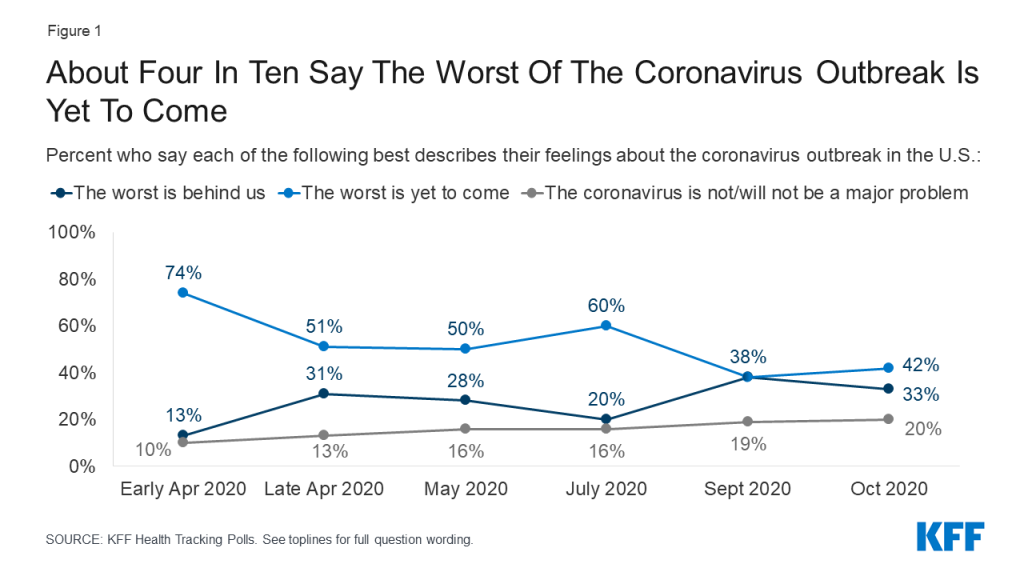
With more than seven million coronavirus cases in the U.S. and more than 200,000 death, two-thirds of adults say they are “very worried” or “somewhat worried” that they or someone in their family will get sick from coronavirus. The share of adults who say they are worried they or a family member will get sick has increased by 13 percentage points, from 53% in April. Mirroring the difference in expectations of what is yet to come in the coronavirus outbreak, women are more likely than men to say they are worried that they or a family member will get sick from coronavirus (73% vs. 58%).
Among partisans, twice as many Democrats as Republicans say they are worried that they or a family member will get sick from coronavirus (87% vs. 42%). Indeed, 53% of Democrats say they are “very worried”. Among independents, two-thirds (66%) say they are at least somewhat worried that they or a family member will get sick from coronavirus.
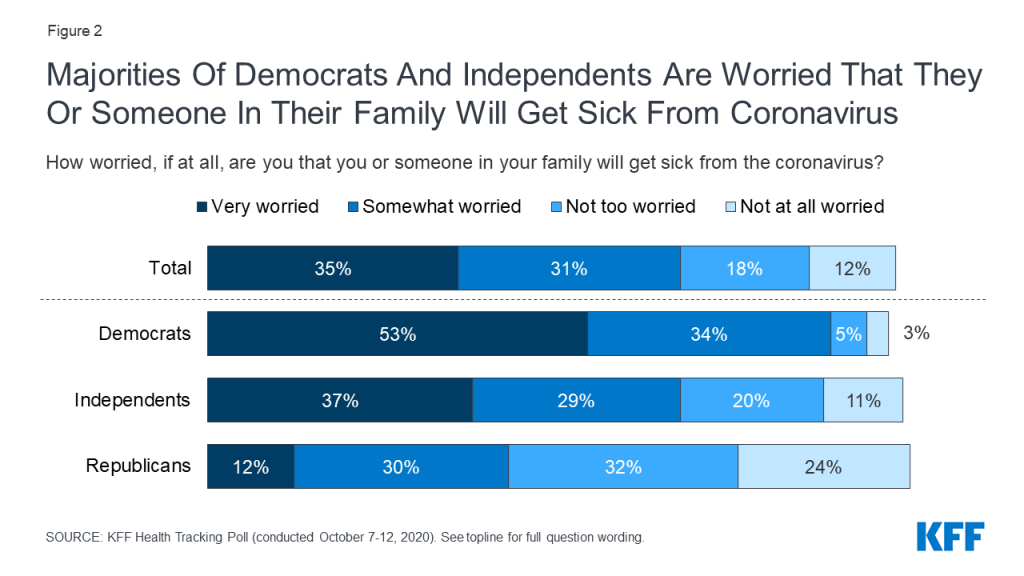
Since we last asked this question in the late April KFF Health Tracking Poll, the share who say they are worried about themselves or someone in their family getting sick from coronavirus has increased by 31 percentage points among Democrats and 12 percentage points among independents, while remaining about the same among Republicans.
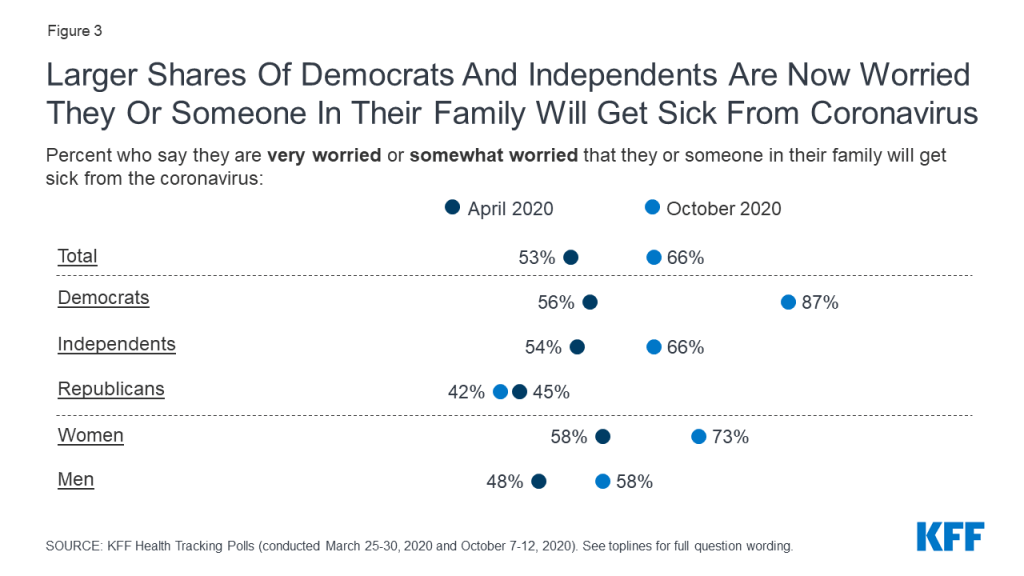
On Friday, October 1st, President Trump announced that he and the First Lady had tested positive for COVID-19. The President was moved to Walter Reed hospital for treatment and returned to the White House on Monday. Since then, more than a dozen people who had been around the President, including several White House staffers and Republican lawmakers, have recently tested positive for COVID-19.
In the wake of these recent events, about three in ten adults say the President’s coronavirus diagnosis makes them “more likely” to take practice social distancing (31%) and to wear facemasks (31%) while few say it makes them “less likely” to do so.
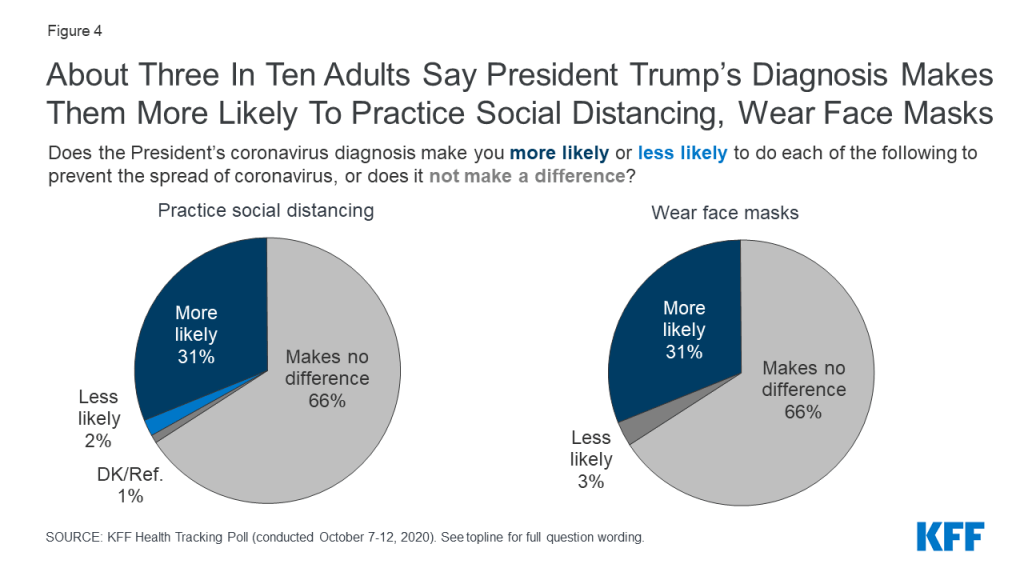
Views of social distancing and wearing face masks continue to be partisan, with about twice as many Democrats as Republicans saying President Trump’s diagnosis makes the more likely to practice social distancing (44% vs. 20%) and wear face masks (40% vs. 20%).
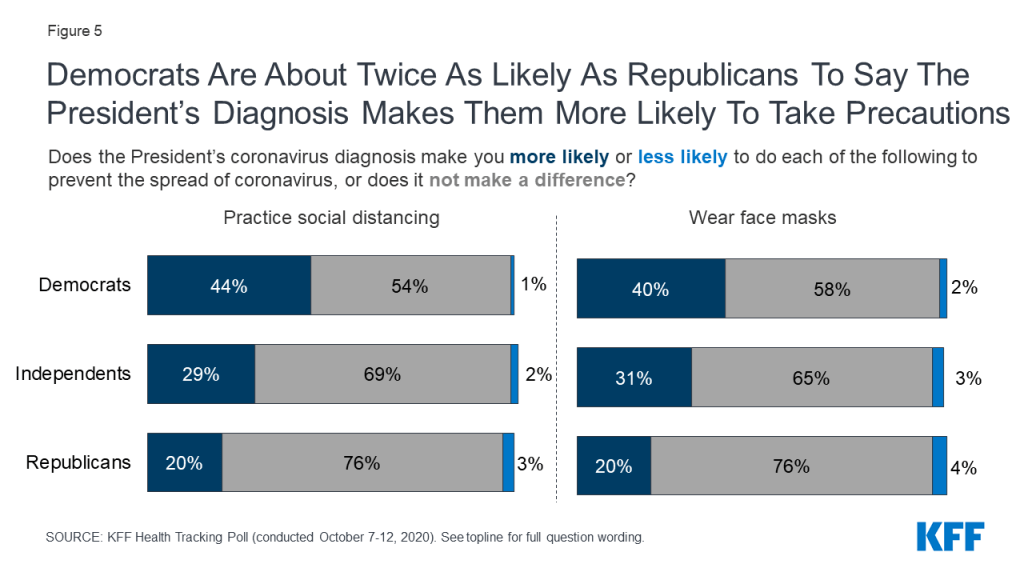
Few Republican voters say President Trump’s recent coronavirus diagnosis changed the likelihood of them voting for President Trump next month. About nine in ten (88%) Republican voters say it did not make a difference in their vote choice.1
Views Of the FDA and the CDC
Recent reports that President Trump has tried to block recent vaccine guidelines from the U.S. Food and Drug Administration (FDA) have highlighted the role that political considerations may take in the approval of a coronavirus vaccine. Overall, the public trusts the FDA with about seven in ten adults saying they have “a great deal” or “a fair amount” of trust that the FDA will make sure that any coronavirus vaccine is safe and effective before it is approved. This includes majorities of Democrats (77%), Republicans (72%) and independents (64%).
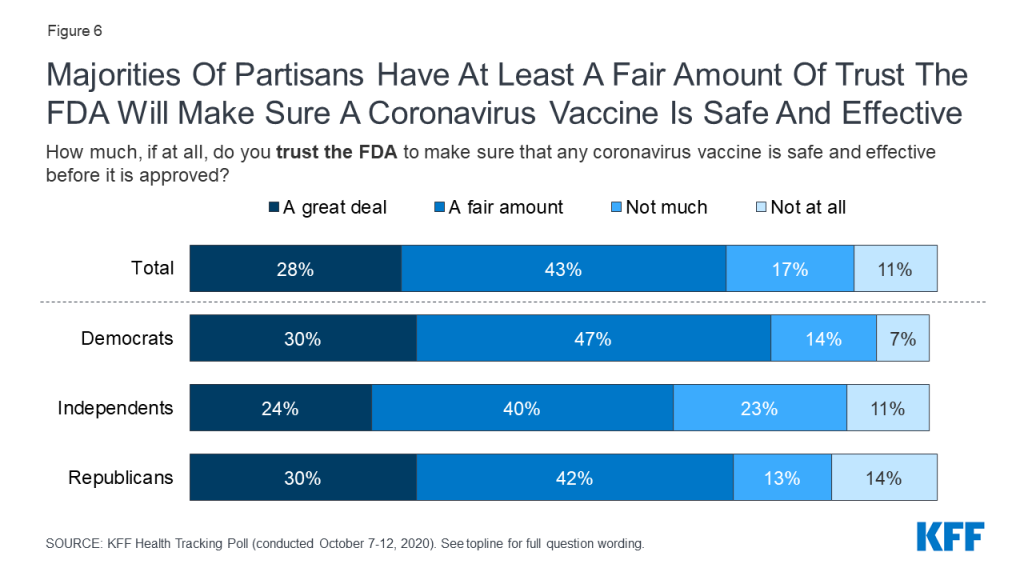
Despite this, many express worry that the FDA will rush to approve a vaccine due to political pressure from President Trump and the White House. About six in ten adults (62%) – including more than eight in ten Democrats and about three in ten Republicans – say they are worried that the FDA will rush to approve a coronavirus vaccine without making sure it is safe and effective, similar to the share who expressed this worry in our September Tracking Poll.
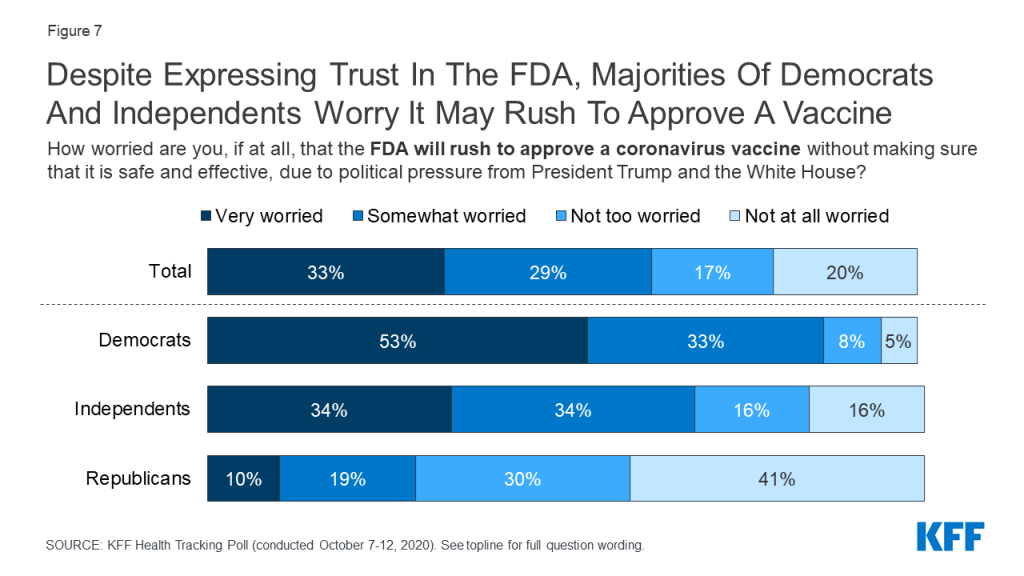
Along with expressing worry that the FDA may rush to approve a vaccine due to political pressure, a majority of the public (55%) think that President Trump is intervening with the FDA’s job of reviewing and approving a coronavirus vaccine and nearly half (46%) of all adults think his intervention is a bad thing. Few (9%) think President Trump is intervening with the FDA’s reviewing of a coronavirus vaccine and that this is a good thing.
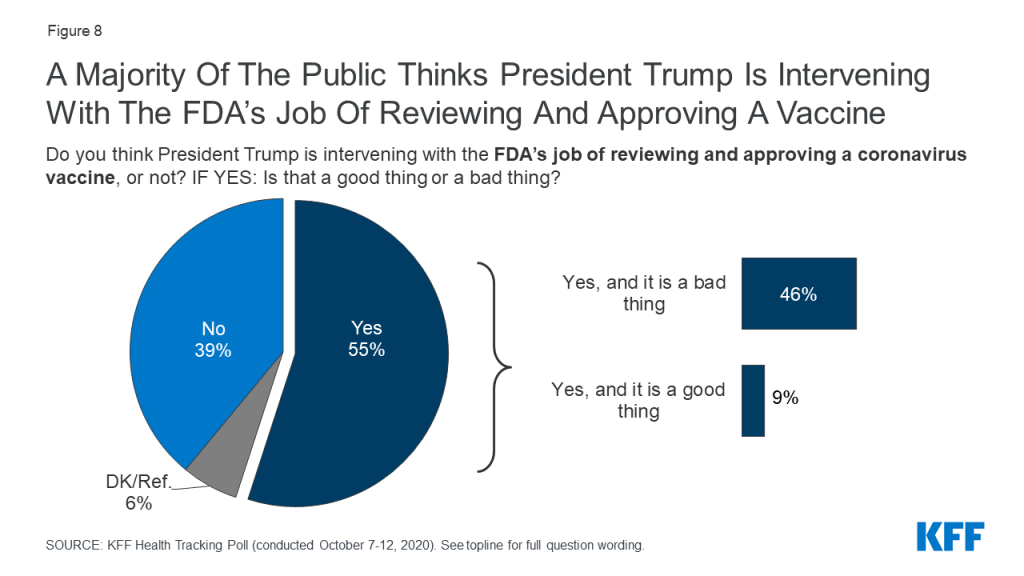
About three in four Democrats (77%) think President Trump is intervening with the FDA’s job of reviewing and approving a coronavirus vaccine and that his intervention is a bad thing. On the other hand, about seven in ten Republicans (69%) do not think the President is intervening. Independents are more divided with about half (49%) saying the President is intervening and this is bad, while four in ten (39%) say they do not think the President is intervening with the FDA.
| Table 1: View of President Trump’s intervention with the FDA by party | |||
| Do you think President Trump is intervening with the FDA’s job of reviewing and approving a coronavirus vaccine, or not? | Democrats | Independents | Republicans |
| Yes, and it is a good thing | 4% | 8% | 18% |
| Yes, and it is a bad thing | 77 | 49 | 9 |
| No | 14 | 39 | 69 |
Similar to views of the FDA, the majority of the public trusts the CDC but about half believe that President Trump is intervening with this federal agency. About seven in ten adults (72%) say they have “a great deal” or “a fair amount” of trust that the CDC will issue guidelines and recommendations related to the coronavirus based on scientific evidence. Compared to trust in the FDA, trust in the CDC is somewhat more partisan though majorities of Democrats (84%), independents (72%), and Republicans (60%) say they have at least “a fair amount” of trust that the CDC will issue coronavirus recommendations based on scientific evidence.
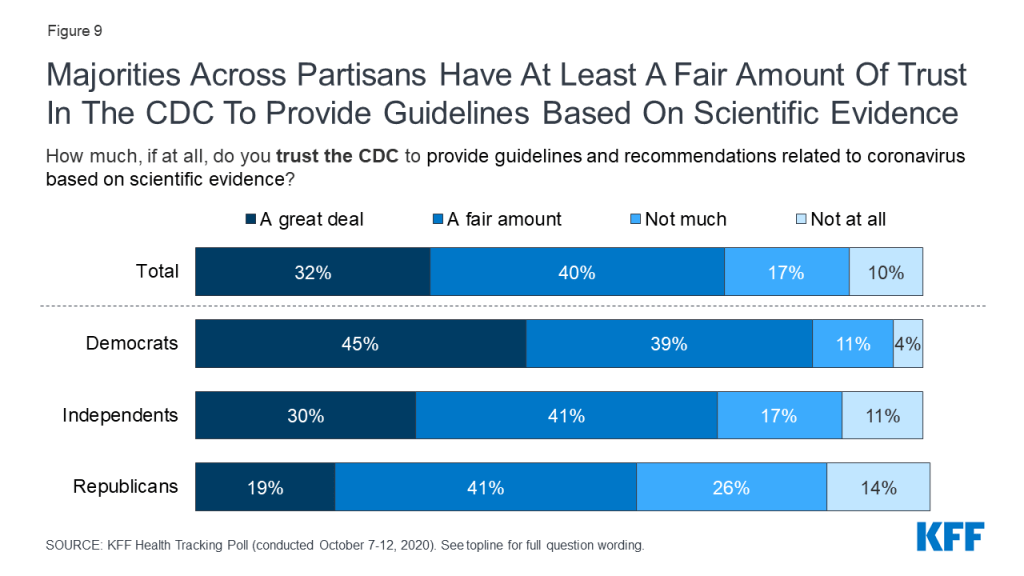
There have been recent reports that politically appointed officials in the Department of Health and Human Services have interfered with coronavirus-related CDC reports. Amidst these revelations, a majority of the public (54%) thinks President Trump is intervening with the CDC’s job of issuing guidelines and recommendations related to coronavirus. Moreover, nearly half of the public (47%) believe intervention by President Trump is a bad thing, while 8% say the President is intervening with the CDC’s job and this is a good thing.
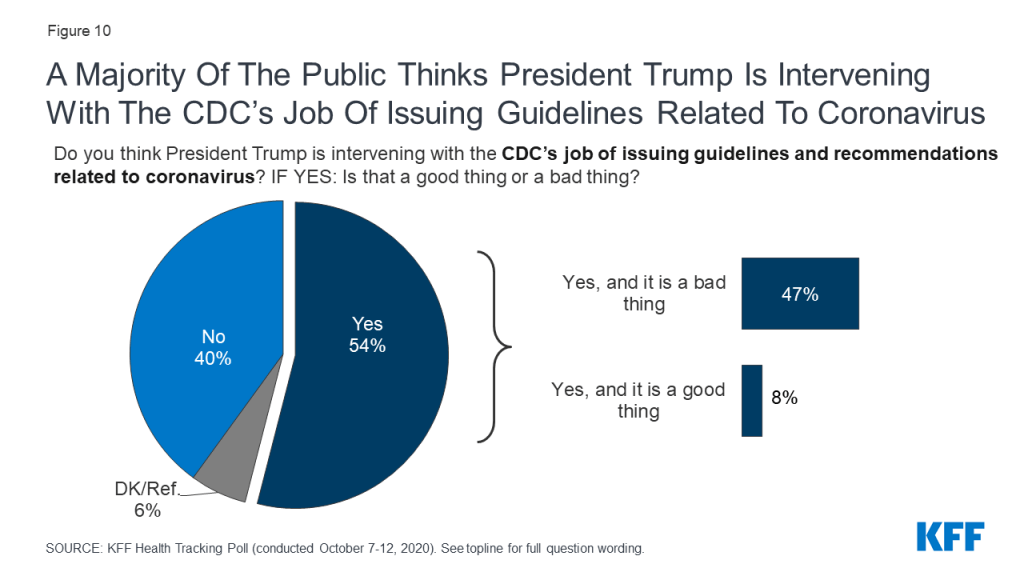
Once again, there is a stark partisan divide with about three in four Democrats (77%) saying they think President Trump is intervening with the CDC and that his intervention is a bad thing as do half (51%) of independents. On the other hand, about three in four Republicans (72%) do not think the president is intervening.
| Table 2: View of President Trump’s intervention with the CDC by party | |||
| Do you think President Trump is intervening with the CDC’s job of issuing guidelines and recommendations related to coronavirus? | Democrats | Independents | Republicans |
| Yes, and it is a good thing | 4% | 7% | 14% |
| Yes, and it is a bad thing | 77 | 51 | 10 |
| No | 14 | 37 | 72 |
Methodology
This KFF Health Tracking Poll was designed and analyzed by public opinion researchers at the Kaiser Family Foundation (KFF). The survey was conducted October 7- 12, 2020, among a nationally representative random digit dial telephone sample of 1,207 adults ages 18 and older, living in the United States, including Alaska and Hawaii (note: persons without a telephone could not be included in the random selection process). The sample included 287 respondents reached by calling back respondents that had previously completed an interview on the KFF Tracking poll at least nine months ago. Computer-assisted telephone interviews conducted by landline (290) and cell phone (917, including 658 who had no landline telephone) were carried out in English and Spanish by SSRS of Glen Mills, PA. To efficiently obtain a sample of lower-income and non-White respondents, the sample also included an oversample of prepaid (pay-as-you-go) telephone numbers (25% of the cell phone sample consisted of prepaid numbers) as well as a subsample of respondents who had previously completed Spanish language interviews on the SSRS Omnibus poll (n=10). Both the random digit dial landline and cell phone samples were provided by Marketing Systems Group (MSG). For the landline sample, respondents were selected by asking for the youngest adult male or female currently at home based on a random rotation. If no one of that gender was available, interviewers asked to speak with the youngest adult of the opposite gender. For the cell phone sample, interviews were conducted with the adult who answered the phone. KFF paid for all costs associated with the survey.
The combined landline and cell phone sample was weighted to balance the sample demographics to match estimates for the national population using data from the Census Bureau’s March 2019 Supplement of the U.S. Census Population Survey (CPS) on sex, age, education, race, Hispanic origin, and region along with data from the 2010 Census on population density. The sample was also weighted to match current patterns of telephone use using data from the January- June 2019 National Health Interview Survey. The weight takes into account the fact that respondents with both a landline and cell phone have a higher probability of selection in the combined sample and also adjusts for the household size for the landline sample, and design modifications, namely, the oversampling of prepaid cell phones and likelihood of non-response for the re-contacted sample. All statistical tests of significance account for the effect of weighting.
The margin of sampling error including the design effect for the full sample is plus or minus 3 percentage points. Numbers of respondents and margins of sampling error for key subgroups are shown in the table below. For results based on other subgroups, the margin of sampling error may be higher. Sample sizes and margins of sampling error for other subgroups are available by request. Note that sampling error is only one of many potential sources of error in this or any other public opinion poll. Kaiser Family Foundation public opinion and survey research is a charter member of the Transparency Initiative of the American Association for Public Opinion Research.
| Group | N (unweighted) | M.O.S.E. |
| Total | 1,207 | ± 3 percentage points |
| Total voters | 1,048 | ± 4 percentage points |
| Party Identification | ||
| Democrats | 387 | ± 6 percentage points |
| Republicans | 339 | ± 6 percentage points |
| Independents | 380 | ± 6 percentage points |
| Party Identification among Voters | ||
| Democratic voters | 354 | ± 6 percentage points |
| Republican voters | 315 | ± 6 percentage points |
| Independent voters | 312 | ± 7 percentage points |
Cross-tabs
Endnotes
- This question was asked of all registered voters who had not yet voted and who did not say they were definitely going to vote for Joe Biden. ↩︎